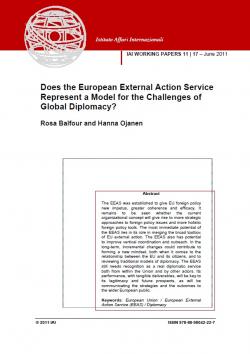Does the European External Action Service Represent a Model for the Challenges of Global Diplomacy?
The EEAS was established to give EU foreign policy new impetus, greater coherence and efficacy. It remains to be seen whether the current organizational concept will give rise to more strategic approaches to foreign policy issues and more holistic foreign policy tools. The most immediate potential of the EEAS lies in its role in merging the broad toolbox of EU external action. The EEAS also has potential to improve vertical coordination and outreach. In the long-term, incremental changes could contribute to forming a new mindset, both when it comes to the relationship between the EU and its citizens, and to reviewing traditional models of diplomacy. The EEAS still needs recognition as a real diplomatic service both from within the Union and by other actors. Its performance, with tangible deliverables, will be key to its legitimacy and future prospects, as will be communicating the strategies and the outcomes to the wider European public.
Una versione precedente del documento è stata discussa al seminario "The EU as a Global Actor: Challenges for the European External Action Service", organizzato da Centro studi sul federalismo (CSF), European Policy Centre (EPC) e Istituto Affari Internazionali (IAI), Torino, 8 aprile 2011.
-
Dati bibliografici
Roma, Istituto Affari Internazionali, giugno 2011, 7 p. -
Numero
11|17 -
ISBN/ISSN/DOI:
978-88-98042-22-7
1. Baptism of fire: the first steps of the European External Action Service
2. Opportunities for a new European foreign policy system
3. A new link to EU citizens and a new model for global diplomacy
4. Conclusions




